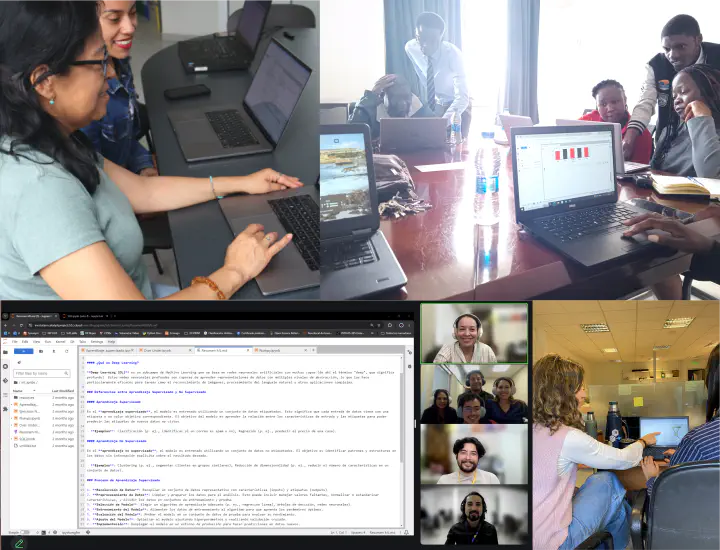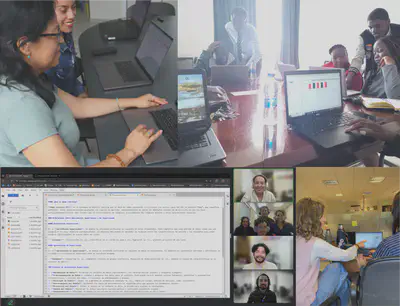Introducing the Catalyst Project Community Partner Highlights

Cross-posted from the Catalyst Project blog

The Catalyst Project is a community-engaged initiative designed to support the adoption of open science principles in under-served bioscientific research communities through the provision of reliable and sustainable cloud computing infrastructure. It’s a project we’ve been working on now for almost two years, which involves staff from seven different organizations: 2i2c, The Carpentries, CCAD, CSCCE, IOI, MetaDocencia, and OLS, and is funded by the Chan Zuckerberg Initiative.
A key part of the project is engaging with Community Partners in Africa and Latin America: Institutions, organizations, and individuals who are undertaking bioscientific research projects that require cloud computing infrastructure. As collaborators on the Catalyst Project, Community Partners can access and use 2i2c’s open science cloud services, and also receive training from 2i2c, The Carpentries, MetaDocencia, and OLS to support their work. Community Partners also play a vital role in shaping an evolving governance model for the Catalyst Project to help sustain, scale, and maximize impact in Latin America, Africa, and under-served communities around the world.
In a new collection of blog posts (that we hope will expand over the next couple of months!) we’re highlighting the work of the Catalyst Project Community Partners. This post is a gateway to learning more about the Catalyst Project and its Community Partners. If you have any questions or feedback about the project, please send an email to the core team.
Highlighting the Catalyst Project Community Partners #
The Catalyst Project currently involves 19 Community Partners, 9 in Africa and 10 in Latin America. Our initial blog post series showcases seven of the Partners, and each post is available in English and Spanish:
African Institute of Biomedical Science and Technology (AiBST) #

At the African Institute of Biomedical Sciences and Technology (AiBST) in Zimbabwe, Zedias Chikwambi and colleagues are working to discover and utilise biomarkers to guide personalized medical treatment.
“Through the Catalyst Project we are able to bring genomic information interpretation to patient bedsides.” - Zedias Chikwambi
Malawi University of Science and Technology (MUST) #

The Catalyst Project Community at the Malawi University of Science and Technology (MUST) is working to popularize the applicability of data science and artificial intelligence in various undergraduate and postgraduate research contexts in Malawi, including health, business, and education.
“…many staff and students need… a robust and easily accessible platform from which they can efficiently run their machine learning models and do advanced data analysis for their data science research…” - Bennett Kankuzi
MolerHealth #

MolerHealth is focused on revolutionizing healthcare in Nigeria by developing an accessible electronic health record (EHR) system aimed at reducing disease misdiagnosis.
“Access to training, like The Carpentries Instructor Training, has empowered our team with essential skills for effective teaching and collaboration.” - Monsurat Onabajo
Nelson Mandela African Institution of Science and Technology (NM-AIST) #

The Northern Tanzania One Health Research Group, hosted at the Nelson Mandela African Institution of Science and Technology (NM-AIST), is using the Catalyst Cloud Infrastructure to understand the transmission dynamics, genetic diversity, and antimicrobial resistance of the Mycobacterium tuberculosis complex (Mtb) between humans and livestock in Northern Tanzania.
“…access to training, particularly through the 2i2c Hub Champion Training, has significantly enhanced our ability to manage and optimize cloud-based resources." - Beatus M Lyimo
Nodo Nacional de Bioinformática (NNB-CCG) #

The Nodo Nacional de Bioinformática (NNB-CCG) of the Centro de Ciencias Genómicas (CCG) - Universidad Nacional Autónoma de México (UNAM) is a group that brings together professionals and academics to support, provide services, and maintain the growth of the field of bioinformatics in the country’s research.
“(Our) goal is to optimize our participation in events, assess the usefulness of the Catalyst Project’s resources, and, in turn, provide the Catalyst Project with guidelines to improve their service by identifying the necessary areas for improvement within the institutions." - Shirley Alquicira Hernández
Instituto Nacional de Enfermedades Respiratorias (INER) #

Collaborators at INER are using the Catalyst Cloud Infrastructure to implement machine learning algorithms that will classify radiology images of pulmonary thromboembolism (PTE), with a view to improving patient outcomes.
“The Catalyst Project is helping us to collaborate more efficiently and work remotely.” - Yalbi I. Balderas-Martinez
Centro Interdisciplinario en Ciencia de Datos y Aprendizaje Automático (CICADA) #

CICADA, an interdisciplinary center researching data science and machine learning, is using the Catalyst CLoud Infrastructure to analyze Uruguayan population data to understand patterns of migration, how much of the native footprint remains, and what can be said about the people who lived in the Uruguayan territory before the arrival of Europeans.
“The Catalyst Project…trainings are attractive, as they are respectful of the people, no previous knowledge is assumed, and the instructors are welcoming.” - María Inés Fariello Rico”
About the blog posts – Acknowledgements #
Creating a series of blog posts to highlight the work of the Catalyst Community Partners was a collaborative effort involving staff from CSCCE, 2i2c, OLS, and MetaDocencia. Specifically, Lou Woodley, Katie Pratt, Jenny Wong, and Tajuddeen Gwadabe conceived the idea during our regular Catalyst Project “website team” meetings, and developed a strategy for reaching out to community partners to gather information.
Katie then led that outreach, which involved a representative of each Community Partners completing a Google Form to answer three key questions and sharing a photo (or a selection of photos) to use on the blog. Katie curated all of the information, edited together the blog posts, and secured sign-off from all of the partners. Sabrina López and her team at MetaDocencia coordinated the translation of the posts from English to Spanish, and Jenny formatted and published them on the website.
Acknowledgements #
- Thanks to the Catalyst Community Partners for generously sharing more about their work.
- Thanks to CZI for funding this work.
Thanks for reading! If you'd like to follow our work, join our mailing list or subscribe to our blog. You can read our community hub documentation or learn about membership.